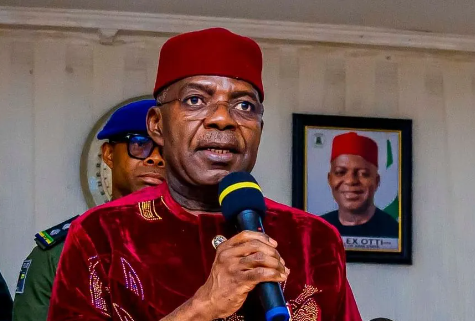Abia State Governor, Alex Otti yesterday presented a proposed budget of N567,240,095,972.00 for 2024 fiscal year to members of the House of Assembly.
Last December, former Governor Okezie Ikpeazu presented a budget of N160.5 billion to the Seventh House of Assembly for this year.
Otti said the 2024 budget proposal, which he christened Budget of New Beginning, targets the expansion of public infrastructure, in line with his administration’s new development targets.
The governor said the budget would scale up access and quality service delivery in the social sector with special focus on Education and Health where the government would commit more than 20 per cent and 15 per cent of the aggregate budget spending.
Otti also said the figure represented more than N400 billion increase over the 2023 estimate of N160.5 billion.
The governor noted that when adjusted for inflation and fall in the value of the naira, the reality of the proposed budget becomes starkly different.
He said,
“The key distinction in the 2024 budget estimate, however, is in the direction of spending. While the 2023 projection allocated 53 per cent of the entire budget for Capital Expenditure, our target in the 2024 fiscal year is to spend 84 per cent of the total expenditure on capital projects and commit 16 per cent to Recurrent Expenditure, as against 47 per cent in the 2023 estimates.
“Of the proposed figure, government’s estimated total revenue is N166,077,717,058, including earnings from our IGR channels, Federation Accounts Allocation Committee (FAAC), grants from multilateral organisations and income from other revenue sources that will be available to the state government over the course of the accounting year.
“We plan to finance the deficit of N401,162,378,914, partly by new borrowings estimated at N385,271,027,214. Fifty per cent of this borrowing will be sourced externally, whilst the balance will be procured domestically.”
Otti announced that in the 2024 fiscal year, the state proposes to commit 44.76 per cent of the budget on the economic sector with the larger chunk of the resources going into works, (16.97 per cent), land and housing (9.9 per cent), agriculture (5.12 per cent), and finance, (5.23 per cent).
Also, Imo State Governor Hope Uzodimma yesterday presented N592.23 billion budget proposal for 2024 to the House of Assembly.
The state had N474.4 billion budgeted for the outgoing fiscal year.
Giving a breakdown of the budget, tagged: Budget of Renewed Economic Growth, Uzodimma said Capital Expenditure would get 82.9 per cent of the total budget, amounting to N491.2 billion, as against N373.6 billion budgeted in this year’s budget.
The governor said the 2024 budgetary allocation for Recurrent Expenditure would be N100.99 billion out of which N43.05 billion is for Overhead Expenditure, as against the N48.33 billion provided as Overhead Cost in 2023, representing 7.27 per cent of the total budget estimate.
He said N15.74 billion is earmarked for Consolidated Revenue Fund Charges (CRFC).
Giving a further breakdown of the budget, Uzodimma said total Recurrent Revenue for the 2024 budget is N241 billion while that of 2023 was N150.45 billion, representing a 60.2 per cent increase in revenue projection.
On sectoral allocation, the governor said N370.09 billion would be used for Economic sector, as against N278.13 billion approved for the sector in 2023, representing 33.1 per cent increase.
He said the Social Service sector got N50.582 billion in 2024, representing a 42.2 per cent increase over this year’s budget, while the Administration Services sector would get N65.30 billion, as against N51.54 billion in 2023, representing 26.7 per cent increase.
In Kaduna State, Governor Uba Sani presented a budget proposal of N458,271,299, 477.66 to the residents for their consideration and input before taking it to the House of Assembly.
The draft budget proposal, tagged: Budget of Rural Transformation for Inclusive Development, comprises a Capital Expenditure of N318,836,576,588.28 and Recurrent Expenditure of N139,434,722,889.38, maintaining the minimum budgeting baseline model of 60:40 ratio of capital to recurrent.
Education got 25.19 per cent, while Health took 15.63 per cent, totaling about 40.82 per cent of the total draft proposed budget.
The assumptions for the draft proposed budget is based on crude oil price averaging at $70 per barrel, production benchmark at an average of 1.6 million barrels per day, an exchange rate averaging at ¦ 750/$1, an inflation rate at 23.6 per cent and mineral ratio at 25 per cent.
Addressing the first town hall meeting of his administration, Governor Sani reiterated his plans to revitalise the economy of the rural areas and ensure human capital development.
The governor said the budget would focus on agriculture, regional, rural economic development, security, infrastructure and human capital development.
The Commissioner for Planning and Budget Commission, Mr. Mukhtar Ahmed, who gave an overview of the draft proposed budget, said it aimed to capture 1 million pro-poor people into the social register and targeted an internally generated revenue (IGR) of N120 billion.


